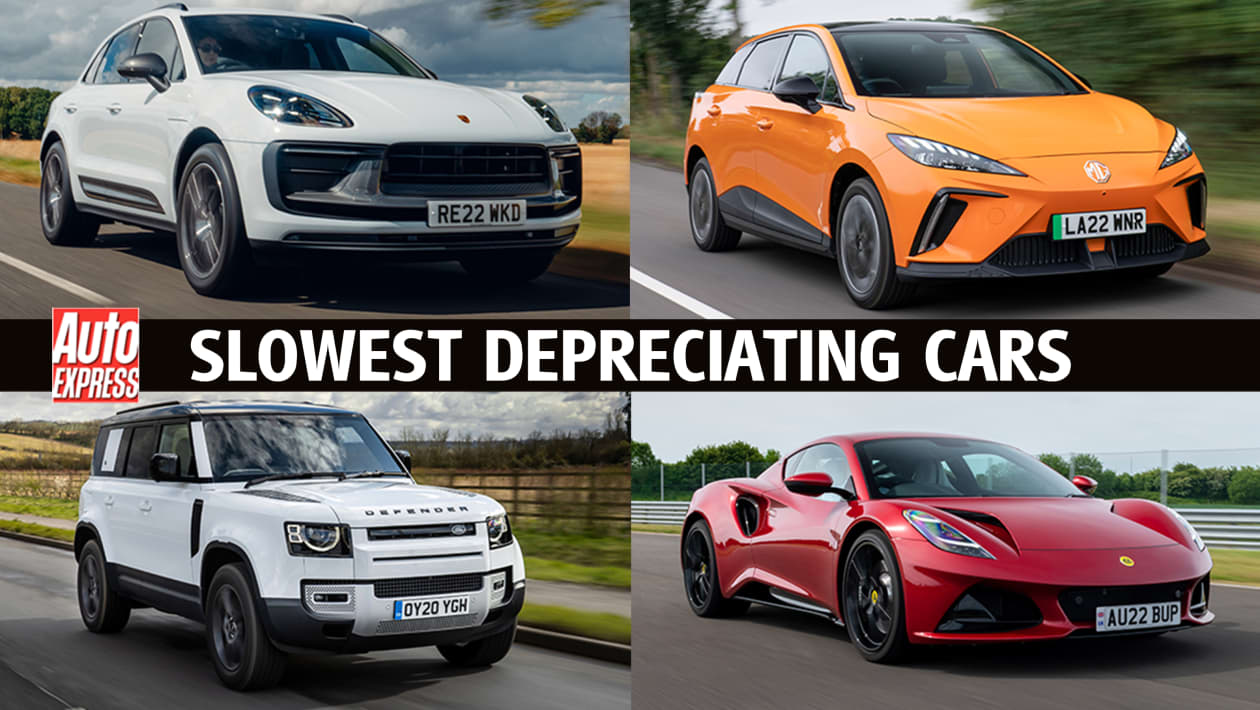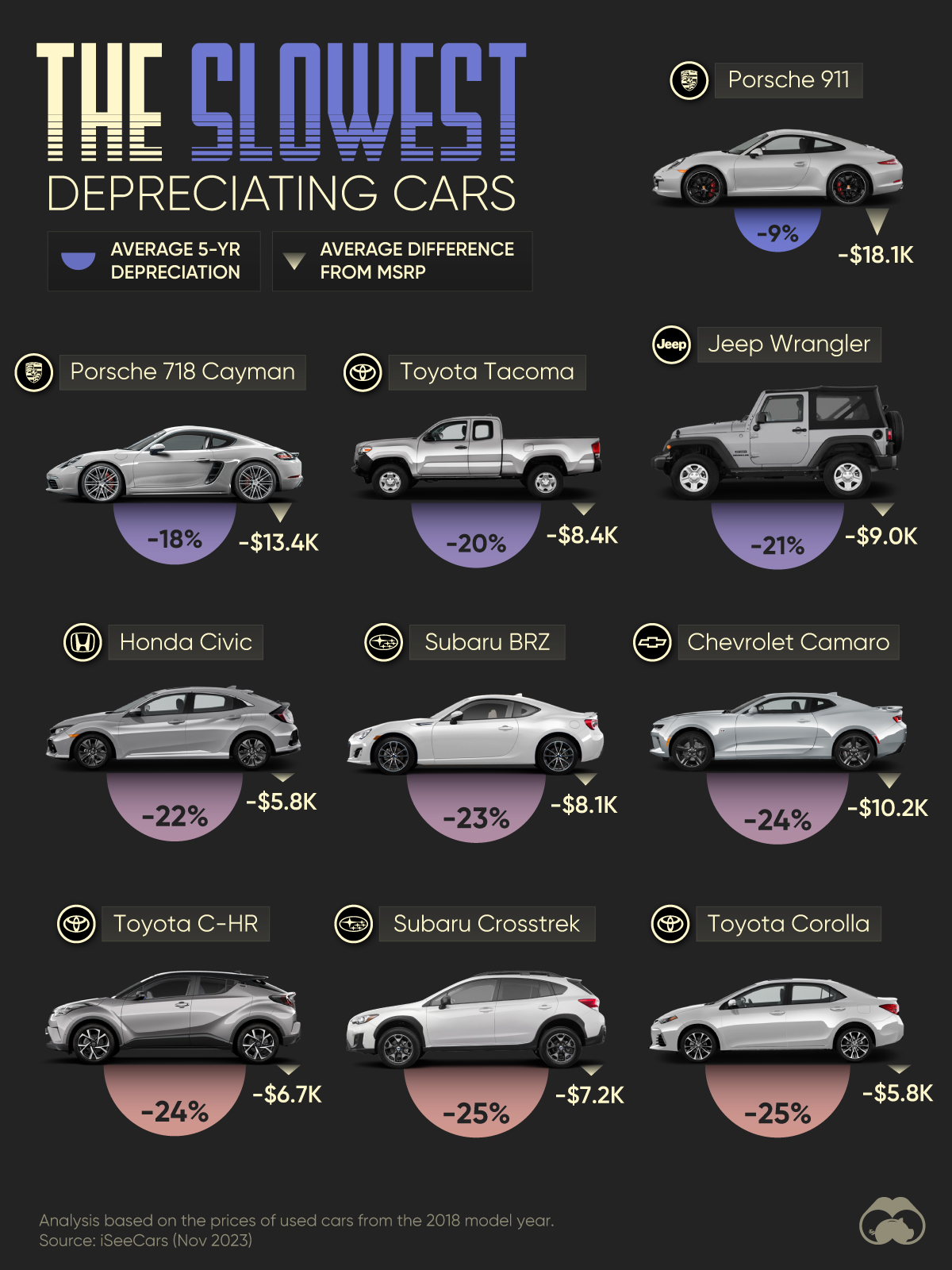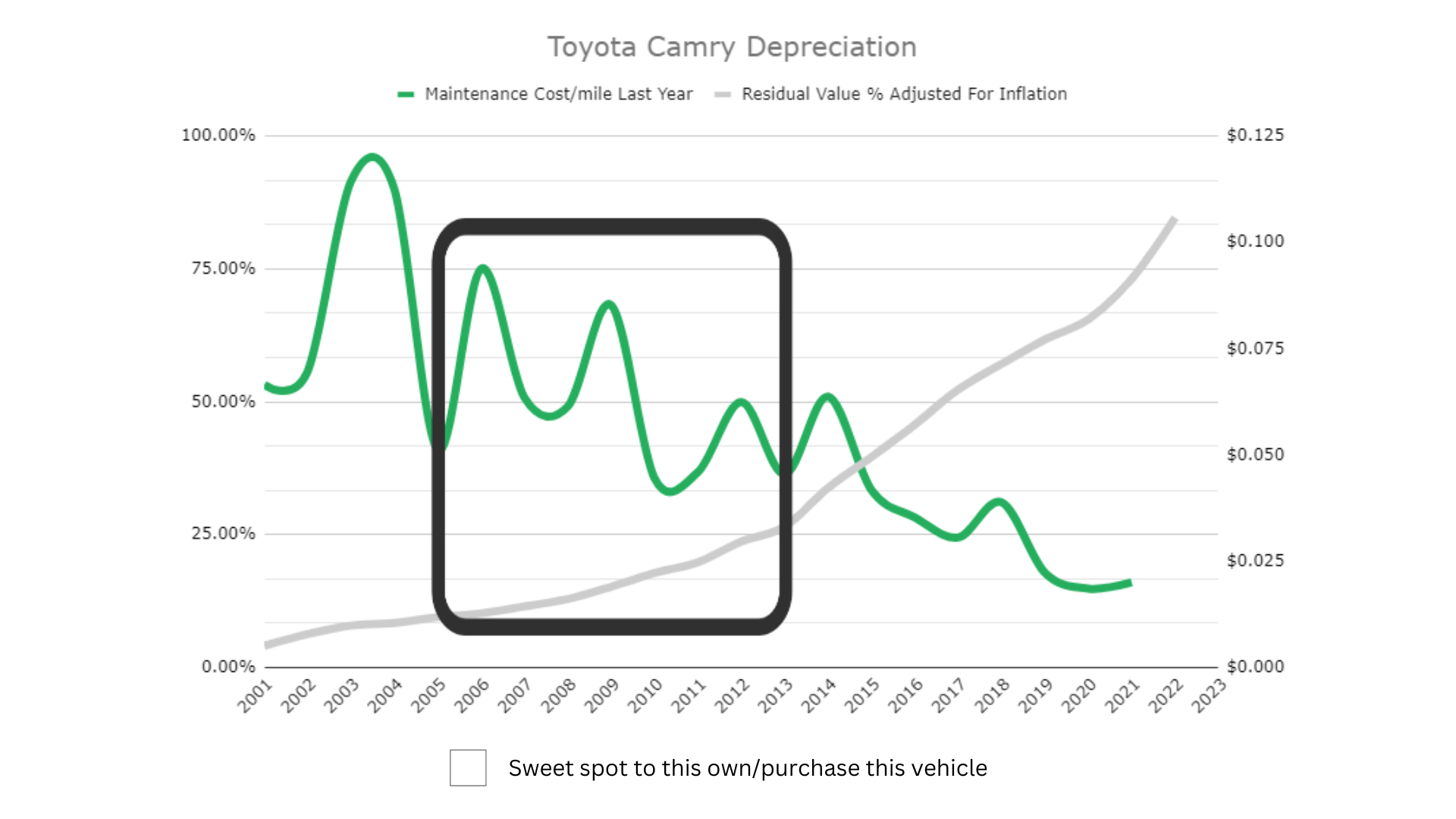Toyota Camrys are renowned for holding their value well, with above-average resale prices and lower-than-average depreciation. Camrys often outperform rivals in maintaining value over time.
Toyota Camrys have earned a reputation for longevity and reliability, both key factors in their ability to retain value and command solid resale prices. With a legacy that encompasses decades of satisfied drivers, the Camry has become a household name, synonymous with quality and durability.
This enduring popularity ensures a consistent demand for Camrys on the used vehicle market, which in turn helps to slow their depreciation rate. Potential buyers and car enthusiasts alike recognize that investing in a Camry is not only about acquiring a dependable ride; it’s also a financially savvy choice. Their low maintenance costs and high fuel efficiency further contribute to the Camry’s economic appeal. These factors combined make the Toyota Camry a wise choice for those seeking a pre-owned vehicle that won’t depreciate as quickly as many other models on the market.
The Resale Reputation Of Toyota Camrys
The resale reputation of Toyota Camrys is a testament to the car’s enduring value and reliability. When shopping for a vehicle, savvy buyers often consider how well a car holds its value. Toyota Camrys have long been praised for their ability to maintain worth over time, making them a smart choice for consumers looking for a cost-effective vehicle in the long run.
Brand Legacy And Market Demand
A strong brand legacy fortifies Toyota Camrys’ standing in the used car market. Known for exceptional quality and longevity, these cars attract a wide pool of potential buyers. Camrys boast of a high market demand which, in turn, bolsters their resale value. Toyota’s reputation for reliability is echoed in the longevity of their vehicles which often exceed owner expectations. This reputation ensures that even older Camrys remain attractive to buyers, thus holding their value well.
Historical Resale Trends
Examination of historical resale trends reveals Toyota Camrys to be steady performers. Data shows that Camrys retain a significant portion of their value even after several years of use. Let’s look at these trends through a few key points:
- High resale value after five years compared to competitors.
- Consistent performance in retention of value over the past decade.
- Recognition by industry experts for lower depreciation rates.
The above points underscore the fact that Toyota Camry models not only weather the depreciation curve well but also are favored in the pre-owned market. This consistently strong performance solidifies Camry’s position as a prudent financial choice for car buyers.

Credit: www.autoexpress.co.uk
Key Factors Influencing Camry’s Depreciation
Key factors that shape the depreciation of a Toyota Camry hinge on various features and owner practices. Understanding these can help prospective buyers and current owners grasp what to expect when it’s time to sell.
Standard Lifespan And Reliability
The Toyota Camry boasts an impressive reputation for lifespan and reliability. Renowned for running well beyond the 200,000-mile mark, Camrys tend to hold their value longer than many competitors. This durability comes from a heritage of engineering excellence and commitment to quality materials.
- Consistent performance over time means less depreciation.
- High reliability ratings reduce the risk for the second owner.
- A long track record as a trustworthy vehicle plays a crucial role.
Maintenance And Ownership Costs
Lower costs for maintenance and repairs contribute to the Toyota Camry’s ability to retain its value. Regular, affordable upkeep prevents major issues that could decrease the car’s resale price.
- Toyota’s parts are widely available and often reasonably priced.
- Frequent, easy maintenance like oil changes prevent costly repairs.
- Camrys generally have lower insurance premiums, thanks to their safety features.
How Mileage Affects Camry’s Resale Value
When thinking about a car’s worth, mileage is a big deal. It’s like counting the car’s birthdays, but with miles, not candles. The Toyota Camry is known for lasting a long time, which is awesome for keeping its value high. Now, let’s see how miles on the dashboard affect how much people will pay for a used Camry.
Average Annual Mileage Benchmarks
The magic number for yearly driving is often pegged at 12,000 to 15,000 miles. Staying within this range is good news for your Camry’s value. A Table to show some quick stats:
| Year | Ideal Mileage Range | Expected Value |
|---|---|---|
| 1 Year | 12,000 – 15,000 miles | High |
| 3 Years | 36,000 – 45,000 miles | Good |
| 5 Years | 60,000 – 75,000 miles | Average |
Impact Of High Mileage
More miles usually mean a lower price. But Camrys are tough. They can handle a lot. Even with the numbers going up, these cars still keep some strong resale game. Here are key high-mileage points:
- Above 100,000: Cross this threshold, and prices may dip, but it’s not a nosedive.
- 200,000-mile club: Join this, and it’s a badge of honor. The value keeps, but it’s more about reliability here.
- Tough cookies: Well-kept Camrys can push further, with the value in their enduring spirit.

Credit: www.visualcapitalist.com
Depreciation Curve: A Year-by-year Analysis
When buying a Toyota Camry, it’s essential to understand its value over time. The depreciation curve helps you see how the car’s value drops. The curve changes each year. Let’s dig into the details of how a Toyota Camry’s worth decreases with time.
First-year Depreciation
New cars lose value quickly. A Toyota Camry is no different. The first year is critical for depreciation. As soon as you drive off the lot, the Camry’s value drops. Experts say new cars can lose 20% to 30% of their value in the first year. This shows in the Camry’s resale price. Yet, Toyota’s reputation for reliability keeps the Camry’s first-year drop lower than many other cars.
| Purchase Price | Value After 1 Year | Depreciation Rate |
|---|---|---|
| $25,000 | $20,000 | 20% |
Long-term Value Retention
How well does a Camry keep its value? Look at the long-term. Over 5 years, some cars lose more than half their value. Not the Camry. It holds its value well. Its durability plays a big part. Year after year, a Camry often keeps more of its value compared to other sedans. After 5 years, a Camry typically retains up to 60% of its original value, making it a smart buy for the long haul.
- 3 Years: About 70% of original value
- 5 Years: Up to 60% of original value
- 10 Years: Still retains value, thanks to reliability
Comparing Camry’s Resale Value To Competitors
When shopping for a car, knowing its future worth is key. The Toyota Camry stands tall among other sedans in preserving value. Let’s see how the Camry stacks up against rivals in holding its resale value.
Market Comparisons With Other Sedans
The Toyota Camry is a popular choice and its resale value reflects this. Below, we compare the Camry to other sedans:
- Honda Accord: Known for reliability, but Camry usually has an edge in resale.
- Ford Fusion: Offers many features but experiences faster depreciation.
- Nissan Altima: Competitive, yet Camry maintains value longer.
- Chevrolet Malibu: A solid option, but trails behind the Camry in resale potential.
The Camry often leads in retaining its worth, outperforming many competitors.
| Car Model | Resale Value After 3 Years | Resale Value After 5 Years |
|---|---|---|
| Toyota Camry | 58% | 49% |
| Honda Accord | 55% | 46% |
| Ford Fusion | 42% | 34% |
| Nissan Altima | 47% | 38% |
| Chevrolet Malibu | 40% | 32% |
Highlights From Resale Value Awards
The Toyota Camry shines in retaining its value over time. Award highlights include:
- Repeatedly grabbing top spots in resale value rankings.
- Earning praise from esteemed industry leaders for its durability.
- Recognition as a vehicle that owners are pleased to resell.
Evidence shows the Camry as a winner in resale value, a testament to its timeless appeal.

Credit: www.fixdapp.com
Effect Of Vehicle Condition On Resale Prices
Understanding how the condition of your Toyota Camry affects resale value is crucial for owners and potential buyers. A well-maintained Camry can fetch a significantly higher price on the resale market than one that has been neglected.
Role Of Cosmetic Appearance
The exterior look of your Toyota Camry plays a vital role in its resale price. First impressions matter. A car that shines with clean, glossy paint and has no dents or scratches will often sell faster and for more money. Here are key factors that impact value:
- Paint condition: Is it vibrant or faded?
- Body integrity: Are there dents, scratches, or rust?
- Interior cleanliness: Is the cabin clean and tidy?
Maintaining these aspects can help maximize your Camry’s resale price.
Functional Deficiencies And Value
When it comes to the mechanical condition of your Camry, functionality is key. Buyers expect a reliable vehicle. Thus, addressing any functional issues is essential. Here’s how various deficiencies can affect the resale price:
| Issue | Impact on Value |
|---|---|
| Engine problems | Significant decrease |
| Transmission issues | Major concern for buyers |
| Electrical faults | Can deter sales |
| Wear and tear | Expected to some extent |
Proper maintenance is paramount. Keep records of all services and repairs. Such documentation adds value by proving the Camry has been well-cared for.
Influence Of Features And Trim Levels
The influence of features and trim levels on a Toyota Camry’s resale value cannot be understated. Selecting the right combination can significantly impact its potential to retain value over time. Let’s explore how different features and trim levels serve as pivotal factors for any Camry’s enduring worth.
High Demand Features
Certain features in a Toyota Camry stir high demand in the resale market.
Advanced safety options, innovative tech, and fuel efficiency top the list.
- Adaptive Cruise Control: Stays popular for adding comfort and safety.
- Entune Audio System: Appeals to tech-savvy buyers.
- Hybrid Engine Variants: Attract eco-conscious consumers.
Trim-specific Value Considerations
The Camry’s trim level plays a crucial role in its depreciation. Entry-level trims may depreciate quicker because they lack unique features.
However, higher trims like the Camry XLE or XSE, packed with premium features, tend to hold their value better. They offer:
| Feature | Description | Impact on Value |
|---|---|---|
| Leather Upholstery | Luxury appeal | Increases |
| Advanced Navigation | High-tech guidance | Increases |
| LED Headlights | Enhanced visibility | Increases |
Special editions and limited runs can also command higher resale values due to their unique offerings and rarity.
Market Trends Shaping Resale Values
The vibrant used car market reflects changing trends that influence the resale value of vehicles. When it comes to the Toyota Camry, known for its reliability and longevity, certain market trends play a pivotal role in shaping its resale value.
Fuel Economy And Tech Advancements
Toyota Camrys stand out for their excellent fuel efficiency, a key factor buyers consider. With fluctuating fuel prices, vehicles that promise more miles per gallon often see higher demand in the secondary market. Further sweetening the deal for used Camrys are the tech upgrades Toyota introduces with each model year. Innovations in driver assistance, infotainment, and hybrid technology make recent models increasingly attractive to tech-savvy buyers.
- Hybrid models excel in MPG ratings, enhancing resale values.
- Advanced safety features increase buyer interest in newer models.
- Infotainment systems with smartphone integration keep the Camry competitive.
Shifts In Consumer Preferences
Consumer tastes influence the types of vehicles that retain value. The Toyota Camry’s design and versatility appeal to a broad audience, ensuring a consistent market. Nevertheless, shifts towards SUVs and trucks impact the resale value of sedans like the Camry. Despite this, Toyota’s reputation for building durable and reliable cars helps the Camry maintain a steadfast position in the resale market.
- A move towards crossover and SUV dominance in the market challenges sedan values.
- The Camry’s reputation and loyal consumer base mitigate these challenges.
- Used Camrys remain popular for their comfort and efficiency.
Maximizing Resale Value: Tips For Owners
Preserving the value of your Toyota Camry hinges on strategic measures. Your vehicle’s worth when resold can mirror the care you invest. This section offers guidance to ensure your Camry remains desirable in the competitive market. Discover how proactive attention to your vehicle’s needs and smart sale timing can lead to optimal resale prices.
Proactive Maintenance Strategies
Regular maintenance shields your car’s value. Here is how you can maintain your Camry:
- Track service intervals. Respect the manufacturer’s schedule.
- Choose quality parts. They prevent further issues.
- Keep records. Log every service and repair.
Present a well-documented history to potential buyers to prove your diligence.
| Service Type | Interval | Comments |
|---|---|---|
| Oil Change | Every 5,000 miles | Essential for engine health |
| Tire Rotation | Every 7,500 miles | Promotes even wear |
| Brake Inspection | Annual | Safety first |
Optimal Timing For Sale
Sell at the right time. Here are key points:
- Study market trends. Seasons affect car sales.
- Consider mileage. Lower numbers attract buyers.
- Avoid peak depreciation. The first years see the biggest drop.
Spring and early summer often yield higher demand for used cars. Also, selling before hitting another 10,000-mile mark can increase your car’s appeal.
Final Thoughts
The Toyota Camry’s reputation for reliability and strong resale value stands undisputed. Its slow depreciation curve makes it a smart buy for value-conscious consumers. Owning a Camry means investing in a vehicle that’s built to last and maintain its worth on the market.
Whether it’s your daily commute or long-term investment, the Camry remains a top contender in retaining value.
